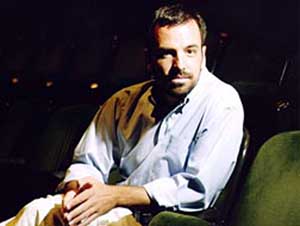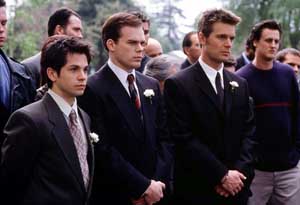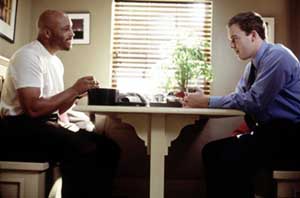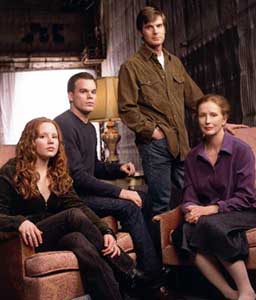-
- Judge rules being called ‘homosexual’ is not libelous
- Gay Republican group protests GOP push to ban same-sex marriage
- Philadelphia airs one of first commercials to attract gay and lesbian tourists
- Gay and lesbian Catholics denied communion at Chicago Mass
- Wilton Manors emerges as a gay mecca
- Internet scammer, using best-selling fraud, gets 33 months
- National News Briefs
- World News Briefs
Arts & Entertainment
Death, dysfunction and the fourth season of ‘Six Feet Under’
Writer Craig Wright talks about the show’s political message, sexuality and what happened to Lisa
Published Thursday, 10-Jun-2004 in issue 859
Smart, ironic, complex and sweetly human, HBO’s “Six Feet Under” returns for a fourth season June 13 after more than a year of dead air. Alan Ball (winner of the Best Original Screenplay Oscar for American Beauty) created the critically acclaimed television drama that follows the Fisher family, who owns and operates the Fisher & Diaz Funeral Home in Los Angeles. The sleeper hit has developed a huge cult following with intelligent characters, quirky situational humor and its use of death as a catalyst to explore reality and identity.
Winner of six Emmys, three Golden Globes and two Screen Actors Guild awards, the gay-friendly “Six Feet Under” also won the Gay & Lesbian Alliance Against Defamation’s Media Award for Outstanding Drama Series.
The Gay & Lesbian Times caught up with Craig Wrght, one of the show’s seven writers, who authored this season’s premiere episode, “Falling Into Place”. A graduate of the United Theological Seminary, Wright joined “Six Feet Under” during its third season. He has received fellowships in playwriting from the National Endowment for the Arts and the McKnight foundation, and penned the drama The Pavilion, which was nominated for a Pulitzer Prize and the American Theatre Critics’ Association Best New Play Award.
During a recent conversation Wright discussed the show’s relevance to current events and its considerable gay audience – as we tried to sneak from him what little tidbits we could in advance of the season premiere.
Gay & Lesbian Times: Whether intentional or not, “Six Feet Under” is a very gay-friendly show – was this intended by the creator?
Craig Wright: Actually, my answer to this will be mostly surmise because I can’t speak for Alan Ball, the creator of the show. But I know that Alan’s vision of the show always included David Fisher – one of the main characters – as being gay, so my guess is that Alan would say that the show was not designed to have a gay following, the show was designed to express Alan’s world view, and Alan’s world view includes diversity. The thing is, if you make any work of art diverse in a way that reflects the reality of the world, well lo and behold you’re likely to attract some minority followings. The truth is, most of what you see in the world of the networks and the major studios does not really reflect the diversity of life. … When you reflect life in all of its wholeness, you speak for all kinds of disenfranchised communities.
GLT: In terms of the show’s gay plotlines, do you take things from current events if they seem relevant or is it all kind of timeless in a way?
CW: No, this season especially has a lot to do with current events and people are going to hear a lot of talk during the season about the issue of gay marriage, because of the recent events surrounding that issue, and also a lot of talk about the Bush presidency and especially the environmental policies of this administration. So I’d say more than ever, the show is a lot more keenly aware of its temporal surroundings.
GLT: The case with a lot of the characters seems to be an exploration of identity through sexuality. Do you find that to be true?
CW: Well, yeah, I do. And again it’s a complicated analysis, because if you have a show on HBO, HBO has a reputation of being a network that presents things that are kind of edgy. … There is more depiction of sexuality, and we try to make those scenes not just voyeuristic but windows into the people’s development. So I’d say yeah, we’re conscious of that. And we look at sexual scenes less as sexual scenes and more as intimate scenes that provide a little more access to the mystery of who these people are and who they’re trying to become – I agree with that, but I guess my point is… we just try to depict the world the way we see it, and sex is part of the world. What’s really weird is that on network TV you don’t see it, you know what I’m saying? That’s the abnormal thing, not the other way around.
GLT: Will you bring back Sarge?
CW: [Laughs] I would say, for fans that have taken an interest in Sarge, they will be satisfied.
GLT: What about Kathy Bates [who has appeared on the show and directed several episodes]?
CW: Kathy Bates does recur in several episodes this season. All the people on the show, who make the show, we just love her, and having her around is a great honor. So that’ll be fun.
GLT: What is the inspiration behind Brenda’s sex addiction?
CW: I wasn’t here for the development of season two, which is when that happened. So I’m not entirely sure why they came up with it. I know that when you hear her talk about it now, she talks about it as if it was a way of evading questions about herself, and certainly questions about her relationship with Nate. If we trust Brenda’s reporting about her own inner state, her sex addiction was all about escaping intimacy with Nate. But whether one sentence like that can be an adequate label for a behavior is probably not valid. People do things for a host of reasons. She may also have done it because it felt good. [Laughs] Probably both.
GLT: Would you consider the show to promote certain political messages?
CW: Yeah, definitely. In two ways: one subtle and one not so subtle. Just in general, airing a TV show that… portrays, or tries to portray, the full diversity of sexuality in America is going to end up making a political statement. … You can’t really be apolitical. Even by refraining to take part in certain dialogues, you’re taking part. So at a certain base level, yeah, the show just by existing is making several statements, mostly on behalf of what is known as the left wing. But above and beyond that, this season especially, because of the gay marriage issue, because of the Bush presidency and because of the Bush administration’s environmental policies, Alan Ball sort of led all of us to try to dare to say a little bit more, and a little more clearly, about where we stand. We feel that it is a very important year because of the election, and here we get to be on TV and saying things, so we don’t want to miss the opportunity to add to the conversation.
GLT: What kind of a tease for next season can you give to fans?
CW: Let me think one quick second about what it would be safe to say. [Pause] I would say that for viewers who are waiting to find out what happened to Lisa, the answers will never get as clear as probably most people wish they would get, but certainly the mystery deepens and unfolds throughout the course of the season. And also, the nature of David and Keith’s relationship shifts and grows over the course of the season in a new direction.
|
|
Copyright © 2003-2025 Uptown Publications





